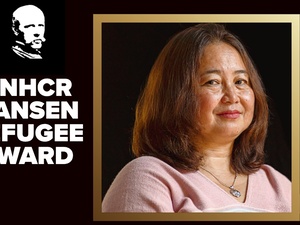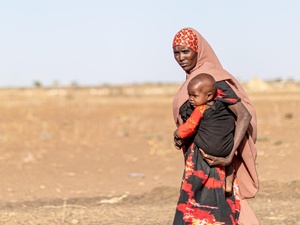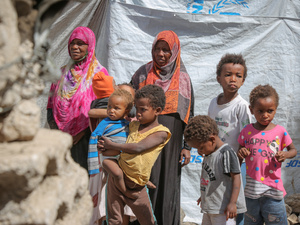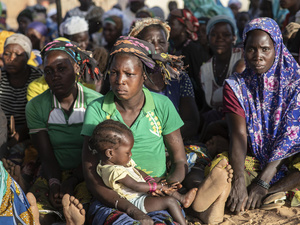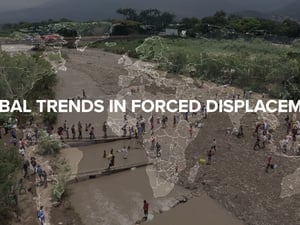Hungry and shivering, Kabul displaced brace for bleak winter
Hungry and shivering, Kabul displaced brace for bleak winter

Internally displaced people line up outside a UNHCR facility near Kabul to receive aid.
At a facility operated by UNHCR, the UN Refugee Agency, about 15 kilometres outside Kabul, a large group of men, women and children are queueing in the autumn sun. With relief coupons in their hands, they are waiting to enter the compound through a gate guarded by a Taliban soldier.
Inside, UNHCR and other humanitarian agencies are distributing aid to more than 1,000 Afghans displaced from around the country who are now living in Kabul. They receive blankets, plastic sheets, cooking stoves, buckets, water jerry cans, soap, hygiene kits and cooking utensils. The most vulnerable also receive some cash assistance.
Most have been sleeping in the open or under makeshift shelters in one of two public parks while those who can afford it are renting apartments across the city.
With winter fast approaching, temperatures in the capital are already reaching close to 0°C at night and may dip to as low as –25°C in mid-winter, putting those sleeping outside at risk of hypothermia.
As people collect their relief items an elderly woman sitting alone on a bench starts shivering uncontrollably. UNHCR staff rush to help her and learn that she has not eaten for days and is about to collapse from hunger.
"We go for days without food."
She is not the only one in desperate need. A mother pleads for an additional packet of cereal so she can feed her children. And a 65-year-old grandfather explains that he has been trying to care for 26 family members since they returned to their home area from Pakistan in July only to find that their home had gone. They moved to Kabul where they have been living in the open since August.
“We go for days without food,” he said, adding that one pack of relief items meant for a family of seven would not go far. “But right now, anything is something.”
Afghanistan is facing a worsening humanitarian emergency with the economy near collapse and about half the population now reliant on aid. There are more than 3.5 million people displaced by conflict inside the country, including some 700,000 forced to flee this year alone.
“I used to plaster buildings before fleeing our village,” said Safi Ullah, 25, who fled from Nangarhar Province in July. “Rockets kept falling near our homes. We were forced to move to Kabul with only the clothes on our backs when our house caught fire after being hit.”
Insecurity is not the only factor forcing people to abandon their homes. Afghanistan is currently experiencing its second severe drought in four years and food production has been hit hard.
“In our own province, we faced drought and economic problems as our farms did not make enough harvest and we did not have any other source of income,” said Ullah as he received his share of aid.
Hunger was widespread even before the Taliban took control of the government two months ago, but it has worsened significantly according to the latest update from the World Food Programme. By mid-September, only 5 per cent of Afghans had enough to eat and one in three were facing crisis or emergency levels of food insecurity.
Over the last two weeks, UNHCR has assisted some 100,000 people throughout Afghanistan with emergency shelters, blankets, solar panels, and cash for the most vulnerable. In total, it has reached more than half a million displaced people with assistance so far this year.
The agency has established a logistics hub in Termez, in neighbouring Uzbekistan, to pre-position and rapidly deliver aid into Afghanistan and is scaling up its response to reach more displaced people before harsh winter weather sets in, but it needs more resources. Only 35 per cent of the funds needed to support operations over the next two months have been received.
Ahmad Seraaj, 14, and his family fled Maidan Wardak Province in central Afghanistan to seek safety in the capital.
“We are a 13-member family and we moved to Kabul after our house was hit by mortar shells,” he said, while queueing for aid with his father. “We only brought a few belongings with us and have been facing economic problems as we cannot find work here. We are in dire need of help.”
Although the fighting has stopped, insecurity persists in their home area and the family is too fearful to return.
"I can't go back."
Some 156,000 displaced people have chosen to return home since fighting subsided, according to UN figures. Over the past week, UNHCR has supported 660 families to return home to northern regions of the country. Returnees receive US$200 per household to pay for transportation and another $400 to help them reintegrate. Another 280 families will receive help to return to the central highlands before the end of October.
But many of those displaced to Kabul worry there is little left for them to return to, their homes and livelihoods having been destroyed by the fighting.
“I can’t go back,” said Mehraboudin, 28, who fled clashes in his home town in Parwan Province in July. “What will I do there? I have no house and there are no jobs.”





